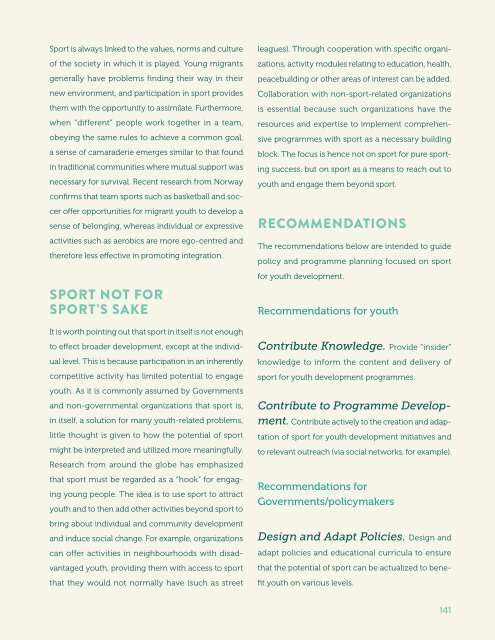YOUTH CIVIC
JieguI2U
JieguI2U
You also want an ePaper? Increase the reach of your titles
YUMPU automatically turns print PDFs into web optimized ePapers that Google loves.
Sport is always linked to the values, norms and culture<br />
of the society in which it is played. Young migrants<br />
generally have problems finding their way in their<br />
new environment, and participation in sport provides<br />
them with the opportunity to assimilate. Furthermore,<br />
when “different” people work together in a team,<br />
obeying the same rules to achieve a common goal,<br />
a sense of camaraderie emerges similar to that found<br />
in traditional communities where mutual support was<br />
necessary for survival. Recent research from Norway<br />
confirms that team sports such as basketball and soccer<br />
offer opportunities for migrant youth to develop a<br />
sense of belonging, whereas individual or expressive<br />
activities such as aerobics are more ego-centred and<br />
therefore less effective in promoting integration.<br />
SPORT NOT FOR<br />
SPORT’S SAKE<br />
It is worth pointing out that sport in itself is not enough<br />
to effect broader development, except at the individual<br />
level. This is because participation in an inherently<br />
competitive activity has limited potential to engage<br />
youth. As it is commonly assumed by Governments<br />
and non-governmental organizations that sport is,<br />
in itself, a solution for many youth-related problems,<br />
little thought is given to how the potential of sport<br />
might be interpreted and utilized more meaningfully.<br />
Research from around the globe has emphasized<br />
that sport must be regarded as a “hook” for engaging<br />
young people. The idea is to use sport to attract<br />
youth and to then add other activities beyond sport to<br />
bring about individual and community development<br />
and induce social change. For example, organizations<br />
can offer activities in neighbourhoods with disadvantaged<br />
youth, providing them with access to sport<br />
that they would not normally have (such as street<br />
leagues). Through cooperation with specific organizations,<br />
activity modules relating to education, health,<br />
peacebuilding or other areas of interest can be added.<br />
Collaboration with non-sport-related organizations<br />
is essential because such organizations have the<br />
resources and expertise to implement comprehensive<br />
programmes with sport as a necessary building<br />
block. The focus is hence not on sport for pure sporting<br />
success, but on sport as a means to reach out to<br />
youth and engage them beyond sport.<br />
RECOMMENDATIONS<br />
The recommendations below are intended to guide<br />
policy and programme planning focused on sport<br />
for youth development.<br />
Recommendations for youth<br />
Contribute Knowledge. Provide “insider”<br />
knowledge to inform the content and delivery of<br />
sport for youth development programmes.<br />
Contribute to Programme Development.<br />
Contribute actively to the creation and adaptation<br />
of sport for youth development initiatives and<br />
to relevant outreach (via social networks, for example).<br />
Recommendations for<br />
Governments/policymakers<br />
Design and Adapt Policies. Design and<br />
adapt policies and educational curricula to ensure<br />
that the potential of sport can be actualized to benefit<br />
youth on various levels.<br />
141


